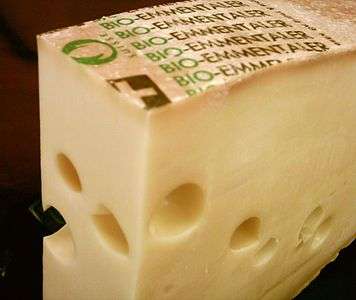Emmental cheese
| Emmentaler | |
|---|---|
 | |
| Country of origin | Switzerland |
| Region, town | Bern, Emmental |
| Source of milk | Cow |
| Pasteurized | Not traditionally |
| Texture | Hard |
| Aging time | 2-18 months depending on variety |
| Certification | Some varieties |
|
| |
Emmentaler or Emmental is a yellow, medium-hard Swiss cheese that originated in the area around Emmental, Canton Bern. It has a savoury, but mild taste. While the denomination "Emmentaler Switzerland" is protected, "Emmentaler" alone is not; similar cheeses of other origins, especially from France and Bavaria but even Finland, are widely available sold by that name. Emmentaler dates to the time of ancient history.[1]
Production
Three types of bacteria are used in the production of Emmentaler: Streptococcus thermophilus, Lactobacillus helveticus, and Propionibacterium freudenreichii. The large holes formed within the cheese are caused by a presence of hay particles which cause gradually larger holes when the cheese is being matured. (This research has not been peer reviewed.)[2] Historically, the holes were a sign of imperfection, and until modern times, cheese makers would try to avoid them.[3] Emmentaler cheese is used in a variety of dishes, particularly in gratins, and fondue, where it is mixed with Gruyère.
Emmentaler in Switzerland in the 21st century

- Emmentaler Switzerland AOC has been registered since 2000[4] as an appellation d'origine contrôlée (AOC).[5] In 2013, it was replaced by the appellation d'origine protégée (AOP) certification. This “original Emmentaler” is produced in small rural dairies with raw cow's milk, adding only natural ingredients (water, salt, natural starter cultures and rennet); preservatives or ingredients from genetically modified organisms are not allowed. The cheese is produced in a round shape with a natural rind, and aged in traditional cellars for a minimum of four months. This Emmentaler has three age profiles: classic - four months, reserve - eight months, and Premier Cru - 14 months.
- Emmentaler Switzerland Premier Cru is a special Emmentaler aged for 14 months in humid caves. It was the first cheese from Switzerland to win the title World Champion at the Wisconsin (USA) Cheese World Championships in 2006.[6] It was nominated best cheese among over 1,700 competitors.[7] For this achievement, it has received a place in the Historic Museum in Bern, Switzerland.
Emmentaler outside Switzerland
Several varieties of Emmentaler have certification, these include:
- Allgäuer Emmentaler, from Bavaria, Germany, has PDO status[8]
- Emmental de Savoie, from Savoie, France, has PGI status[9]
- Emmental français est-central from Franche-Comté, France, also has PGI status[10]
See also
References
- ↑ Ehlers, S.; Hurt, J. (2008). The Complete Idiot's Guide to Cheeses of the World. Complete Idiot's Guide to. Alpha Books. p. 76. ISBN 978-1-59257-714-9. Retrieved May 19, 2016.
- ↑ "Swiss cheese hole mystery solved: It's all down to dirt - BBC News". Bbc.com. 2015-05-28. Retrieved 2016-05-14.
- ↑ Scientific American Cheese Story August 2010 Pg 33
- ↑ "AOC-Label für den Käse mit den grössen Löchern". Swiss Info. 13 September 2004. Retrieved 11 December 2009.
- ↑ "Archived copy". Archived from the original on December 11, 2010. Retrieved December 11, 2009.
- ↑ "Worlds Best Cheese" (PDF) (Press release). Von Mühlenen AG. 24 March 2006. Retrieved 2009-12-11.
- ↑ Nick Heyen (2008-03-12). "City Hosts Super Bowl Of Cheese Experts And Entrants From Around The World Are In Madison For The World Championship Cheese Contest, A 'Big Deal' In Cheese | News". host.madison.com. Retrieved 2016-05-14.
- ↑ "DOOR". Ec.europa.eu. 1997-01-24. Retrieved 2016-05-14.
- ↑ "DOOR". Ec.europa.eu. 1996-06-21. Retrieved 2016-05-14.
- ↑ "DOOR". Ec.europa.eu. Retrieved 2016-05-14.
External links
| Wikimedia Commons has media related to Emmental (cheese). |
- Emmentaler in the online Culinary Heritage of Switzerland database.
- Cook's Thesaurus: Semi-Firm Cheeses